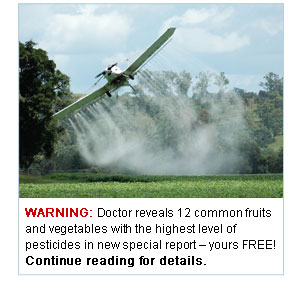Five Dangerous
Toxins Invading Your Brain
What You Must Do NOW to Limit Your Exposure —
and Reverse Your Current Level of Damage
Exclusive Mind
Health Update
By Travis Davis
Newsmax Health Publisher

Pests . . .
I don't like 'em and I'm sure you don't either.
You don't want to sink your teeth into a juicy apple or an ear of corn — and find yourself biting into an unsavory worm.
You don't want to take a sunset stroll around your neighborhood just to find yourself mercilessly attacked by hungry, disease-causing mosquitoes.
And I'm sure you don't want to live in a home overrun by ants, termites, or even microscopic germs.
That's why our human ingenuity led us to develop pesticides.
Surprisingly, these pest-mitigating chemicals aren't modern. In fact, the ancient Mesopotamians used sulfur to dust their crops for protection against pests 4,500 years ago.
And we've developed a lot of specialized pesticides since then.
These days, almost 1 billion pounds of pesticides are used just on fields and orchards in the United States — each year. These chemicals not only coat edible products, but also drift into nearby communities.
Crop dusters and other pest control machines spray a variety of chemical products onto what we are destined to put in our mouth.
And these pesticides are not limited to spraying the food we eat.
Many communities use insecticides dispersed by truck-mounted fogging units to control the mosquito population.
We use insecticides to fight bugs in the home. Poisons to combat weeds in our yard. Even disinfectants to combat bacteria in our kitchen and bathroom.
Pesticides are here to stay.
Yet for all the good they do, there is an obvious downside to their use.
Research indicates that pesticides can increase your risk for Alzheimer's disease and other types of dementia by about 40%.
Plus, pesticides increase your risk for developing:
- Attention-deficit and hyperactivity disorders
- Parkinson's disease
- Even suicidal thoughts and other mental and neurological disorders
Since pesticides incapacitate the nervous system of the bugs they are designed to kill, it's not surprising that they also affect our human brain and nervous system.
And Pesticides Are Only Part of the Problem
In addition to pesticides, these four metals are chief sources of brain-damaging toxic exposure:
- Mercury
- Lead
- Aluminum
- Cadmium
These four "danger" metals are commonly found in polluted air, tap water, cigarette smoke, and cosmetics.
Additionally, cadmium or lead may leach from pipes or paint. Mercury is found in fish, dental fillings, even vaccines. Aluminum leaches from cookware, antacids, and antiperspirants.
And this is only the tip of the iceberg.
We're exposed daily to these noxious metals and chemical compounds from a wide variety of sources.
Toxicity from these metals can lead to:
- Depression and anxiety
- Memory problems
- Difficulty concentrating
- Nervousness and irritability
- Tremors or numbness
- Aggression
- Insomnia
- Lack of coordination
- Dizziness and confusion
- Lowered intelligence
Since these symptoms could be related to many causes, it's hard to know what could be the effect of chronic brain toxins.
Fortunately, you have the ability to minimize the effects of these hazardous — even potentially lethal — chemical substances.
Fight Back Against Brain Toxins FREE, Starting Today!
This article continues: https://www.newsmaxstore.com/newsletters/mhr/free_toxins.cfm?promo_code=92C2-1